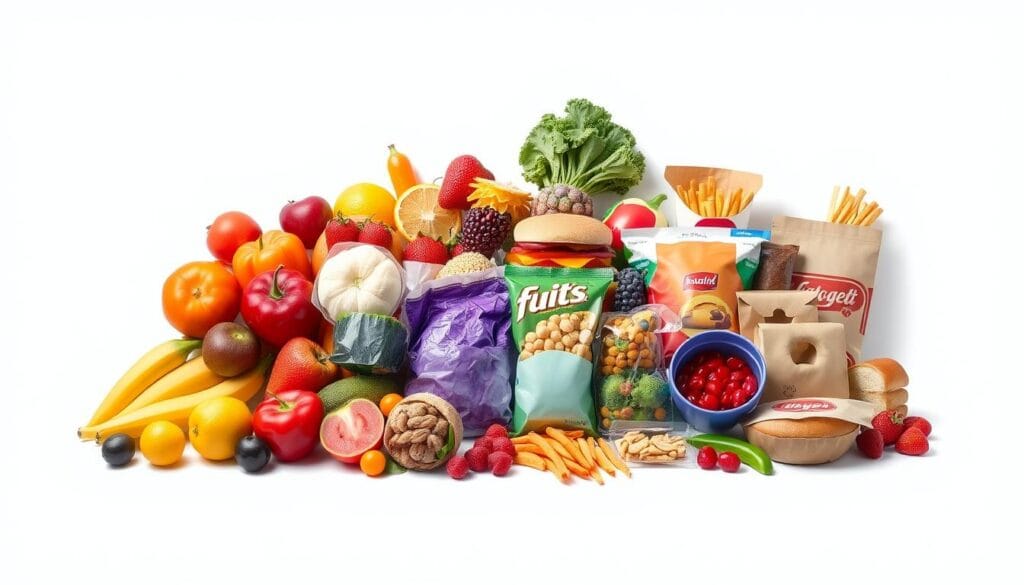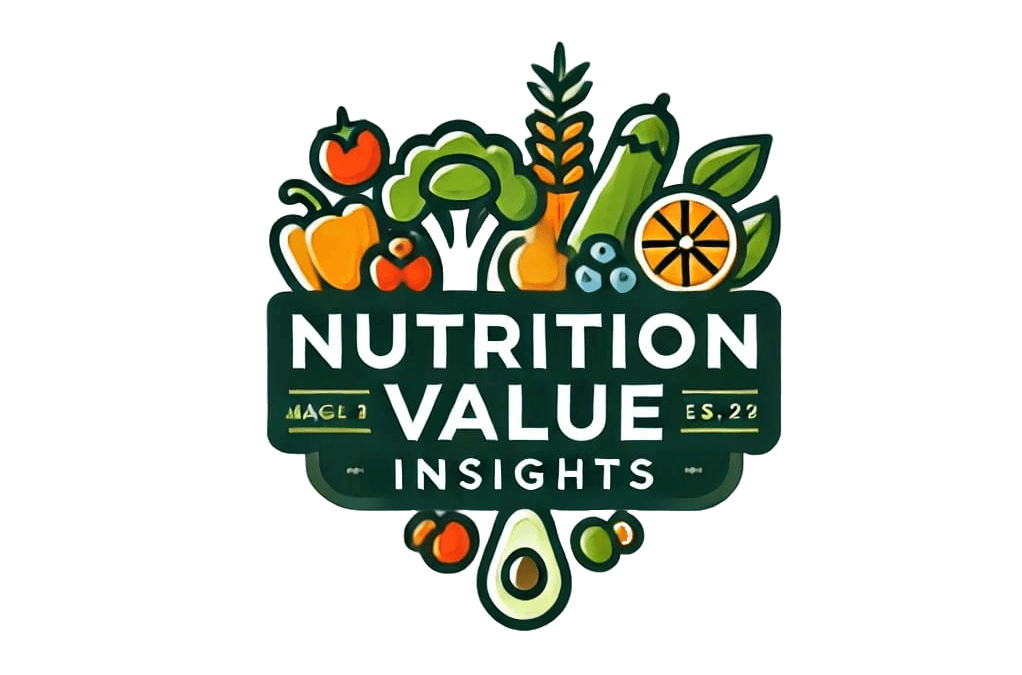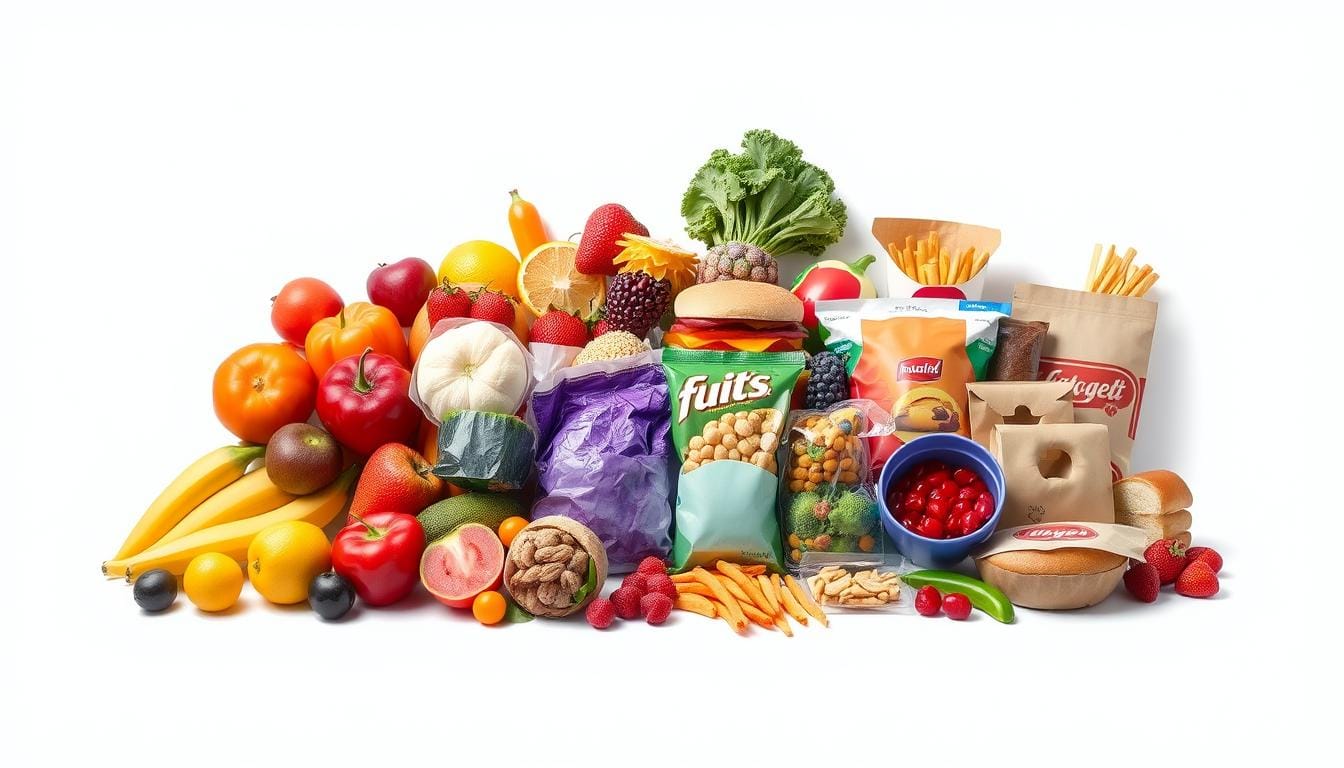The Impact of Ultra-Processed Foods on Health in America.
In the United States, ultra-processed foods are everywhere, making up 57% of what adults eat and 67% for kids. This is bad news for health, as studies show these foods can lead to serious health problems. For example, eating more of these foods can raise your risk of death by 31% over 19 years.
A big study in the BMJ found that eating these foods is linked to heart disease and diabetes. It looked at 9,888,373 people and found strong evidence. nutrition facts It showed that eating more of these foods can increase your risk of heart disease by 50% and diabetes by 12%.

The study also found strong links to other health issues. These include higher risks of death, depression, and obesity. It even found connections to heart disease, anxiety, sleep problems, wheezing, and obesity.
Table of Contents
Understanding Ultra-Processed Foods on Health
In today’s world, ultra-processed foods are everywhere in the American diet. They lack natural nutrients and are made from food extracts with added artificial ingredients. This makes them a big part of the NOVA food classification system.
Definition and Classification
Ultra-processed foods have little to no whole food in them. They are heavily processed and filled with added sugar, salt, and food additives. These foods go through many steps like hydrogenation and extrusion to taste good and last longer.
Common Examples in American Diet
- Packaged snacks and chips
- Soft drinks and sugary beverages
- Instant soups and ready-made meals
- Frozen pizza and baked goods
- Processed meats like hot dogs and deli slices
Processing Methods and Additives
Making ultra-processed foods involves chemicals, preservatives, and artificial flavors. These are added to improve taste, texture, and shelf life. But, they can also harm our health.
| Processing Methods | Common Additives |
|---|---|
| Hydrogenation Extrusion Molding Dehydration Curing | Sodium nitrite Artificial sweeteners Emulsifiers High-fructose corn syrup Monosodium glutamate (MSG) |
Knowing about ultra-processed foods is key to understanding our food choices. It helps us make better decisions for our health in today’s world.
The Rise of Processed Food Consumption in America
In recent decades, the American diet has changed a lot. Now, ultra-processed foods make up a huge part of what we eat. These foods are often full of additives and preservatives. They now make up 57% of caloric intake in adults and 67% in children.
Many factors have led to this increase. Convenience and aggressive marketing play big roles. Also, the food environment has changed a lot. Ultra-processed foods are now everywhere, especially in big cities.
The US is the biggest consumer of these foods, followed by the UK. Eating too much of these foods is bad for our health. It can lead to over 30 health conditions, like heart disease and diabetes.
It’s important to tackle the rise of American diet trends and processed food consumption in the U.S . We need to understand why people are eating more of these foods. Then, we can work on making healthier choices easier for everyone.
Health Risks and Mortality Rates
Recent studies show that eating ultra-processed foods can harm our health. A study in the British Medical Journal (BMJ) found a link between these foods and higher risks of heart disease and type 2 diabetes.
Cardiovascular Disease Risk
People who ate the most ultra-processed foods had a 50% higher risk of heart disease. They also had a 21% higher risk of dying from any cause compared to those who ate less.
Cancer and Chronic Diseases
Ultra-processed foods were also linked to higher risks of cancer and other diseases. Processed meats were especially bad for health.
Impact on Life Expectancy
Over 114,000 American adults were studied for 30 years. Those who ate the most ultra-processed foods had a 4% higher risk of dying. They also had an 8% higher risk of dying from brain diseases.
But, eating better foods was good for health. Even those who ate a lot of ultra-processed foods could stay healthier by eating more whole foods.
| Metric | Highest Quarter of Ultra-Processed Food Consumption | Lowest Quarter of Ultra-Processed Food Consumption |
|---|---|---|
| All-Cause Mortality Rate | 1,536 per 100,000 person-years | 1,472 per 100,000 person-years |
| Cardiovascular Disease-Related Mortality Risk | 50% higher | – |
| Mortality from Neurodegenerative Diseases | 8% higher | – |
The health risks of ultra-processed foods are alarming. It’s crucial to choose whole, minimally processed foods for better health and longer life.
Mental Health and Ultra-Processed Foods
Research is showing a worrying link between ultra-processed foods and mental health. Studies found that eating more of these foods can lead to anxiety and depression.
One study looked at nearly 10 million people. It found that eating more ultra-processed foods increased the risk of anxiety and mental disorders by 48-53%. It also showed a 22% higher risk of depression with more of these foods.
There are several reasons for this link. Ultra-processed foods are made to be very tasty and addictive. They also lack the nutrients needed for brain health and mood. This can harm mental health, especially when it messes with the gut microbiome.

Changing these foods to be healthier is hard because making money is often more important. To tackle the mental health effects of ultra-processed foods, we need a broad approach. This includes public policies that encourage eating whole, less processed foods.
Metabolic Impact and Weight Management
Ultra-processed foods (UPFs) are linked to rising obesity and type 2 diabetes in the U.S. These foods are high in calories and low in nutrients. They make up over half of what Americans eat every day.
Obesity Connection
Research finds that eating more UPFs raises the risk of obesity. Obesity costs the U.S. healthcare system $140 to $215 billion annually. Since 1980, obesity rates in adults have doubled, hitting 36.2% in 2016.
Blood Sugar Regulation
UPFs can mess with blood sugar levels. Eating these foods increases the risk of type 2 diabetes. People who eat more UPFs are 1.88 times more likely to have poor blood sugar control.
Metabolic Syndrome
UPFs are also tied to metabolic syndrome. This condition raises the risk of heart disease and diabetes. Those who eat more UPFs are 2.07 times more likely to have high triglycerides, a part of metabolic syndrome.
“The prevalence of excess weight (overweight and obesity) doubled between 1980 and 2008 globally, driven in part by the rise of ultra-processed foods in the global food supply.”
It’s key to tackle the metabolic effects of UPFs to improve health. This is vital for fighting obesity, diabetes, and other chronic diseases.
Ultra-Processed Foods and Nutritional Value
Ultra-processed foods often lack in nutrition. They are high in energy, salt, sugar, and fat. But they are low in nutrients, fiber, and vitamins. This can lead to health problems like heart disease and diabetes.
Not all ultra-processed foods are bad. Some, like whole grain cereals, have good nutrients. But it’s the overall diet quality that matters most for health.
| Nutrient | Ultra-Processed Foods | Whole, Minimally Processed Foods |
|---|---|---|
| Energy | Higher | Lower |
| Salt | Higher | Lower |
| Sugar | Higher | Lower |
| Saturated Fat | Higher | Lower |
| Dietary Fiber | Lower | Higher |
| Micronutrients | Lower | Higher |
| Vitamins | Lower | Higher |
Ultra-processed foods can harm your health. Choose whole, minimally processed foods to get more nutrients. This supports your overall health and well-being.

“The quality of the diet, not individual foods, is crucial for health outcomes.”
Focus on a balanced diet with nutrient-rich foods. This helps you reach your health goals and stay well for the long term.
Impact on Children and Adolescents
Ultra-processed foods harm kids and teens just as much as adults. Studies show that young people in the U.S. eat a lot of these unhealthy foods.
Dietary Patterns in Youth
Research finds that kids eat a lot of ultra-processed foods. In fact, 67% of their daily calories come from these foods. This can shape their eating habits for life.
Long-term Health Consequences
Eating too much of these foods can lead to serious health problems. This includes childhood obesity, type 2 diabetes, and other chronic diseases. For every 100 kcal and 100 g of ultra-processed foods, kids’ body fat increases.
The world is facing a big problem with childhood obesity. By 2025, about 206 million kids and teens will be overweight. In some Latin American countries, up to 25% of kids and teens are overweight.
We need to focus on improving youth nutrition to protect the health of future generations. This means reducing processed food consumption in children.
“The prevalence of ultra-processed food consumption in youth is linked to a range of long-term health issues, including childhood obesity, type 2 diabetes, and other chronic diseases.”
Socioeconomic Factors and Food Access
Socioeconomic factors greatly affect how much ultra-processed food people eat in the United States. Those who struggle with food insecurity often can’t afford healthy food. This makes them rely more on unhealthy options.
This issue can lead to more health problems in low-income areas. It also makes health gaps wider.
Studies show that people with less money and education eat more ultra-processed foods. This can expose them to harmful chemicals like phthalates. Pregnant women in these groups might face higher risks of health issues for their babies.
Choosing healthier foods could lower phthalate exposure. But, money can be a big barrier for those with lower incomes. It’s important to make healthy food options more affordable.
Creating policies to reduce harmful additives in food is key. This can help protect everyone’s health and ensure fair access to food.
FAQ
What are ultra-processed foods and how do they differ from other types of processed foods?
Ultra-processed foods are made in factories and have little to no real food. They often have lots of added sugar, salt, and artificial stuff. Examples include chips, soda, instant soups, and frozen meals.
How prevalent are ultra-processed foods in the American diet?
In the U.S., 57% of what adults eat and 67% of what kids eat are ultra-processed foods. This is because they are easy to find, marketed well, and fit into our busy lives.
What are the health risks associated with ultra-processed food consumption?
Eating too much of these foods can lead to heart disease, diabetes, and even death. They might also increase the risk of cancer and brain diseases. Plus, they can make you gain weight and get diabetes.
How do ultra-processed foods impact mental health?
Eating a lot of these foods can make you feel anxious and depressed. It’s like they’re bad for your mind too.
What are the nutritional implications of a diet high in ultra-processed foods?
These foods are not good for you because they lack nutrients. They have too much bad stuff like sugar and fat. This can make you sick.
How does ultra-processed food consumption affect children and adolescents?
Kids and teens eat a lot of these foods, with 67% of their calories coming from them. This can harm their health for years to come, leading to obesity and diabetes.
How do socioeconomic factors influence ultra-processed food consumption?
People who can’t afford healthy food often eat more ultra-processed foods. This makes health problems worse in poor areas. It’s unfair and hurts their health.
DID OUR INFORMATION HELP YOU ?
There are no reviews yet. Be the first one to write one.

